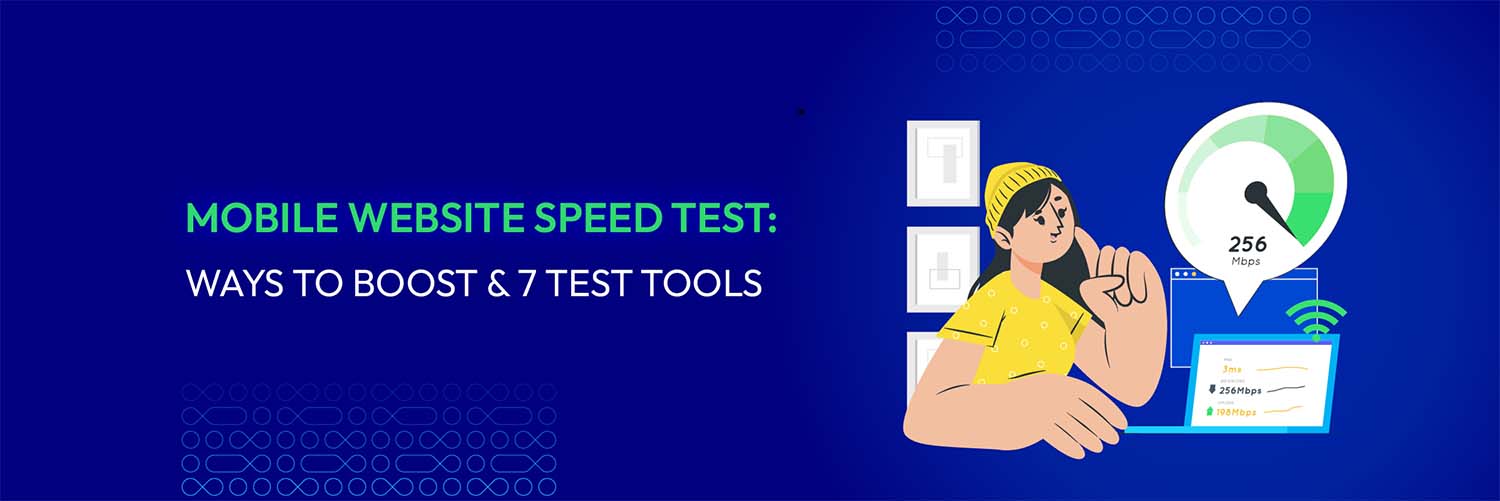Mobile Website Speed Test: A Complete Guide
07-19-2023

In today’s fast-paced digital world, mobile devices dominate how we access the internet. With over 58.67% of global website traffic coming from mobile devices in the last quarter of 2023, ensuring your website performs optimally on smartphones has never been more critical. A slow-loading mobile site can significantly impact user experience and conversion rates, with research showing that 53% of users abandon a site if it takes more than 3 seconds to load. Given this, performing regular mobile website speed tests is essential to maintaining competitiveness and delivering a smooth user experience.
In this blog, we’ll explore the key metrics of mobile site speed, walk you through how to run a mobile website speed test, and share practical tips to enhance your site’s performance.
Why You Should Test Mobile Website Speed?

For the following reasons, it’s critical to test a mobile website’s speed:
Improve User Experience
A smooth, fast-loading mobile site is essential to keeping users happy. When your website takes too long to load, users may become frustrated and leave, which negatively affects their experience. In fact, more than half of mobile users will abandon a site if it doesn’t load within 3 seconds. A fast site creates a positive first impression, reduces bounce rates, and keeps users on your site longer, ultimately improving overall satisfaction.
Enhance Search Engine Ranking
Google has made mobile speed a ranking factor, especially with the introduction of Core Web Vitals. A fast mobile website improves your chances of ranking higher in search results, which increases visibility and organic traffic. Speed tests help you stay compliant with search engine algorithms and ensure optimal performance.
Dominiate Mobile Traffic
As we mentioned in the introduction, mobile devices now account for over half of global internet traffic. With this shift, ensuring a seamless mobile experience is essential to cater to this massive user base. Testing your site speed regularly ensures that your mobile visitors get the fast, reliable experience they expect, maximizing the potential of this growing traffic segment.
Boost Conversion Rates
Speed directly influences conversion rates. Mobile sites that load in 2 seconds or less experience a 15% higher conversion rate compared to slower ones. Conversely, a slow-loading website increases the likelihood that users will leave, losing out on conversion and sales opportunities. By regularly testing and optimizing your mobile site speed, you can reduce friction in the user journey and boost your overall revenue.

Gain A Competitive Advantage
Mobile optimization is still challenging for many websites, allowing your company to stand out. You may show dedication to providing a top-notch user experience by investing in mobile website speed tests and optimization. This can help you get and keep clients, cultivate trust and loyalty, and put you ahead of rivals who might overlook the significance of a mobile website’s functionality.
Key Metrics of Mobile Website Speed Test
When it comes to mobile website performance, there are specific metrics that help gauge how well your site is optimized for mobile users. Understanding these key metrics will allow you to identify issues and make targeted improvements. Here are the most important metrics to focus on when testing your mobile website speed:
-
First Contentful Paint (FCP): Measures how long it takes for the first piece of content (text, image, etc.) to appear. For mobile users, a fast FCP is crucial because it gives immediate feedback that the site is loading. Aim for under 1.8 seconds for mobile.
-
Largest Contentful Paint (LCP): Represents how long it takes for the largest visible content (often an image or video) to load and become usable. On mobile devices, this is critical since larger files may take longer to load due to slower network connections. Keep it under 2.5 seconds for a good user experience.
-
Time to Interactive (TTI): This metric shows how long it takes for the page to become fully interactive. This is especially important on mobile devices where slower processors may delay interactivity. Target under 3.8 seconds for optimal performance.
-
Total Blocking Time (TBT): Total Blocking Time refers to the time between FCP and TTI, where the page is partially loaded but not yet interactive. A good benchmark is under 200 milliseconds.
-
Cumulative Layout Shift (CLS): Measures your mobile site’s visual stability by tracking content shifts during loading. On small screens like smartphones, layout shifts can disrupt navigation and cause accidental clicks. Keep the score below 0.1 for a better user experience.
-
Speed Index (SI): Speed Index is a metric that calculates how quickly the content of a page is visually displayed during loading. It’s especially relevant for mobile users, who often deal with slower network speeds. A Speed Index below 3.0 seconds is ideal for mobile users.
-
Mobile-First Performance: It’s important to evaluate your mobile site based on mobile-first performance standards. Tools like Google’s PageSpeed Insights provide mobile-specific results, which are more relevant than desktop scores. You should focus on how your site performs on mobile networks (e.g., 3G, 4G) and under different conditions like low bandwidth or high latency.
Top 7 Free Mobile Website Speed Test Tools In 2025
With numerous free tools available, testing your mobile website’s speed is easier than ever. Below are seven of the best free tools in 2024 that can help you optimize your site’s performance.
Google PageSpeed Insights
PageSpeed Insights, a Google product, evaluates the performance of both mobile and desktop websites. It provides a performance score on Core Web Vitals and offers recommendations to optimize images, CSS, and JavaScript for faster load times. Additionally, it gives insights on how your site performs across different networks and devices, helping you ensure a smooth user experience.
Key Features:
-
Core Web Vitals analysis
-
Detailed recommendations
-
Mobile and desktop performance comparison

WebPageTest
WebPageTest lets you evaluate your mobile website’s speed and functionality using real devices and browsers from various global locations. It provides metrics like load time, first-byte time, and fully loaded time. Detailed waterfall charts help identify bottlenecks and offer improvement suggestions. You can also adjust settings like network speed and location to get accurate insights into your site’s mobile performance.
Key Features:
-
Choose device and network conditions for testing
-
Detailed waterfall analysis
-
Visual comparison of performance across multiple tests

GTmetrix
GTmetrix offers mobile testing features with detailed reports on page load times, size, and optimization suggestions. It provides valuable metrics to guide improvements and lets you test your site’s speed from various regions and devices, making it ideal for assessing mobile performance.
Key Features:
-
Regional testing options
-
Waterfall charts for speed insights
-
Suggestions for performance improvements

Uptrends
Uptrends is a versatile tool that tests mobile website speed and monitors overall site performance. It offers detailed reports on loading times, performance grades, and optimization opportunities, allowing you to evaluate how your site performs on various devices and across multiple locations. With features that simulate different screen sizes and networks, Uptrends helps identify mobile performance issues while tracking your site’s performance over time.
Key Features:
-
Mobile device simulation
-
Detailed breakdowns of page speed elements
-
Historical data to track improvements over time

Pingdom
Pingdom is another reliable tool that tests website speed and performance from various locations around the world. It provides a detailed breakdown of load times and identifies bottlenecks that could be slowing down your mobile website.
Key Features:
-
Location-based testing
-
In-depth performance breakdowns
-
Historical data tracking for ongoing monitoring
Dotcom-Tools
Dotcom-Tools provides a quick and easy way to test your website’s speed from multiple global locations. You can select specific mobile browsers and network types to get an accurate representation of mobile performance.
Key Features:
-
Tests across multiple locations and devices
-
Mobile browser and network simulation
-
Comprehensive performance reports
Yellow Lab Tools
Yellow Lab Tools offers in-depth performance testing, focusing on front-end issues like JavaScript execution, DOM complexity, and layout shifts. It’s a great tool for mobile websites as it evaluates performance and gives detailed suggestions to improve mobile speed.
Key Features:
-
Detailed front-end performance insights
-
Evaluates JavaScript, DOM complexity, and layout shifts
-
Visual performance breakdown
You might be interested in: 8 Top-Notch Tools to Monitor Website Performance
How to Improve Your Mobile Website’s Speed?
Your site’s mobile page speed must be increased for mobile consumers to have a flawless surfing experience. The following techniques can help you increase the speed of your mobile website:
- Optimize images: Image optimization involves resizing and compressing images to reduce file size without sacrificing quality. Utilize cutting-edge picture compression techniques and image formats like JPEG or WebP. Moreover, think about employing lazy loading to load images as they are seen.
-
Minimize CSS and JavaScript: CSS and JavaScript files should be minimized and combined to reduce their size and number. Get rid of redundant libraries and plugins, and delete any extraneous code. Tools for minification can help you organize your code and eliminate extra characters and whitespace.
-
Utilize browser caching: Turn on caching to save static resources on users’ devices. Accessing cached content rather than sending fresh requests to the server, enables returning visitors to your site to load it more quickly. To determine how long resources should be cached, configure caching headers.
-
Reduce server response time: To reduce the time it takes the server to react to requests, optimize your server’s configuration and code. Make sure your database queries are quick, turn on caching, and think about employing a content delivery network (CDN) to distribute material among several servers.
-
Minimize redirects: Redirects should be kept to a minimum because too many make the server generate extra round trips, which slows down loading. You can decrease the number of redirects by updating internal links and ensuring that external links lead straight to the desired location.
-
Use a responsive design: Utilize a responsive theme, which automatically modifies the layout and content to fit the user’s screen size. As a result, there is no need for distinct mobile versions of your website, and all devices will perform at their best.
Learn more: How to improve website performance?
Tips for Maintaining Mobile Website Speed Over Time
Maintaining your mobile website’s speed requires ongoing efforts to ensure it continues to perform optimally as your site grows and technologies evolve. Here are some practical tips for keeping your mobile site fast over the long term:
Regular Speed Tests
Regularly test your mobile website speed to identify any emerging performance issues. Use tools like Google PageSpeed Insights or GTmetrix to monitor speed and track improvements. Routine testing ensures that you stay on top of any performance dips that may occur due to content updates or technical changes.
Monitor and Update Software
Continuously review the extensions or plugins you use on your site. Outdated or unnecessary features can bloat your code and slow down your website, especially on mobile devices. Keep only essential elements, ensure they’re regularly updated, and remove any that are no longer needed.
Keep Your Code Clean and Efficient
As you add new features and content, make sure your website’s code remains clean and efficient. Avoid cluttering your code with unnecessary elements, and periodically audit your CSS, JavaScript, and HTML to streamline performance.
Optimize for New Devices and Network Conditions
Mobile technology evolves rapidly, with new devices and networks constantly being introduced. Regularly test your site on the latest smartphones and slower network connections (e.g., 3G, 4G) to ensure it remains optimized for all users. Make adjustments as necessary to accommodate different screen sizes and mobile network conditions.
Monitor Third-Party Scripts
Third-party scripts like analytics tools, ads, and social media embeds can slow down your mobile site. Regularly audit these scripts and remove or replace any that are no longer necessary or slow to load. The fewer third-party scripts you use, the faster your site will perform.
Server Maintenance and Upgrades
Your hosting environment plays a significant role in your mobile website’s speed. Perform routine server maintenance, ensure your software and hardware are updated, and consider upgrading your server resources (like RAM or bandwidth) as your site grows to prevent bottlenecks.
Stay Updated with Web Performance Best Practices
The landscape of web performance is constantly evolving. Stay up to date with the latest best practices and optimization techniques to keep your mobile website competitive. Regularly review industry resources and blogs to learn about new tools and methods to maintain your site’s speed.
Get 1 Month Support For Free
Sign up for our 6-month maintenance package now!
Conclusion
In today’s mobile-first world, website speed is crucial to delivering a smooth user experience, improving search engine rankings, and boosting conversions. By understanding how to test your mobile website speed, you can identify performance issues and make targeted improvements. Regularly optimizing images, minimizing code, and managing fonts can help you achieve faster load times, while ongoing maintenance ensures that your site stays fast and reliable for users over time.
With mobile traffic continuing to dominate, investing time in testing and optimizing your mobile website speed is essential for staying competitive and providing an exceptional user experience. Start testing today and take action to make your site faster, more responsive, and ready for the future.







